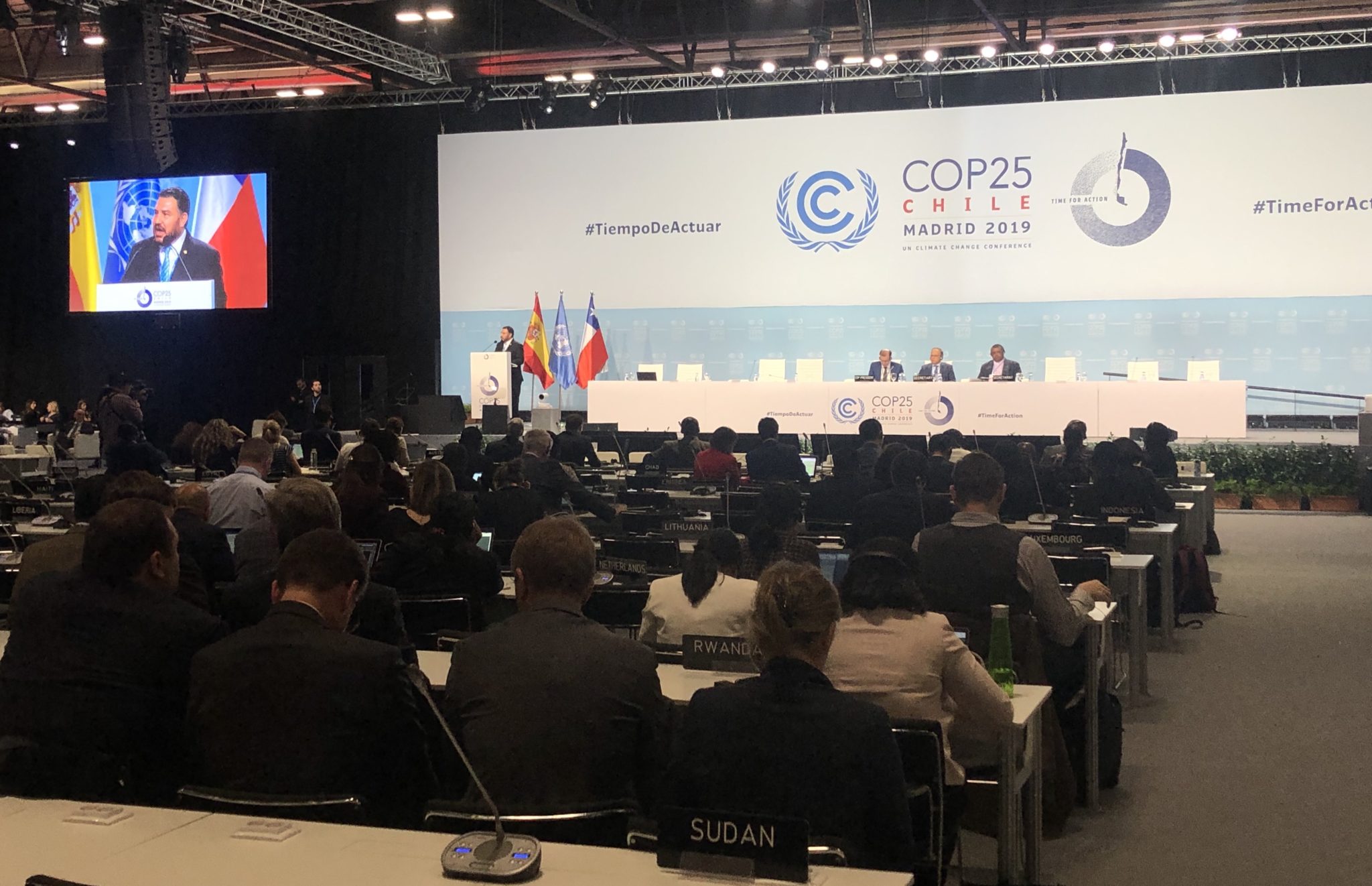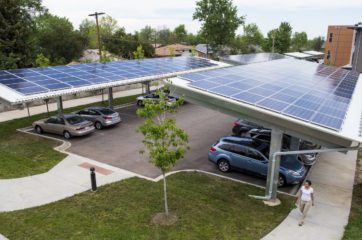This week, I’m at COP 25 in Madrid, Spain, for the 25th meeting of the Conference of the Parties to the United Nations Convention on Climate Change. Despite the two-week conference nearing its end, there aren’t any real outcomes yet on exactly how negotiations will play out. I’m currently sitting next to a Chinese delegate at the main plenary who tells me it’s likely that the conference will be extended into the weekend, but that nothing has been confirmed. There’s a very strong overall sense among attendees that negotiations are going poorly, and that despite a year in which climate change has been elevated to the forefront of international attention, insufficient progress has been made.
I’ll be staying at COP today for as long as observers are allowed, and will be posting developments as they come in (follow along on twitter @noadalz), but for now, here are my three takeaways from this week, live from Madrid:
“We are reaching the final hours of the process of the COP, and now is the time we must show the world that we are capable of getting consensus and agreement,” – #COP25 President Carolina Schmidt
addresses delegates. Article 6 requires more work, she says.— Noa Dalzell (@noadalz) December 13, 2019
1. A few major players are obstructing negotiations
The United States, Brazil, and Australia are holding up negotiations, announced Costa Rican Minister of Environment and Energy Carlos Manuel Rodriguez at a High Ambition Coalition press conference this morning. The High Ambition Coalition — a group of countries determined to step up emission reductions — expressed significant concern regarding how negotiations were developing heading into the last day of the conference, particularly regarding the implementation of carbon markets and the Article 6 rulebook (read more on the Article 6 controversy here).
Rodriguez called the current state of negotiations “unacceptable” and noted that the issues of double counting, the carry-over of Kyoto Protocol credits, and the explicit codification of human rights have been particularly contentious. “Without a clear agreement that these are non-negotiable issues, we won’t be able to move ahead,” he added.
It’s particularly noteworthy that the US is stalling negotiations given that it is formally withdrawing from the Paris Agreement and will not be in the treaty in less than a year.
Australia has been problematic in regards to Article 6 negotiations, for its push for carry-over credits to count; under the Paris Agreement, the country must reduce its emissions by 452 million carbon tons, but wants to use leftover Kyoto Protocol credits to cover 411 million tons of that goal. When Australia signed Kyoto in 1997, it set a target to limit increases to 8% above 1990 levels through 2012 — this target was easy to achieve, and Australia never got close to that ceiling. For it to be able to apply Kyoto-era credits to most of its required emission reductions would be a travesty, and small island states on the frontline of climate change have adamantly opposed this loophole.
Multiple sources have maintained that Brazil’s role has far outweighed the rest of Latin America’s, and Bolsonaro’s denial of climate change and exclusion of civil society from negotiations has inhibited negotiations.
A potential bright spot has been the European Commission’s announcement of the European Green Deal, a plan for the entire continent to be “climate neutral” by 2050. The EU has maintained it wants an ambitious outcome that “stresses the urgency of action and is based on science” an EU representative said at the afternoon’s stock-take. There’s hope that the EU’s announcement will increase the ambitions of other countries’ nationally-determined contributions, but time is running out. “This is Europe’s man on the moon moment,” said European Commission President Ursula von der Leyen during a press conference on Wednesday.

2. Youth-led protests have dominated the conference
After a year of worldwide school strikes and protests mobilized by youth groups like Sunrise Movement and Fridays for the Future, it comes as no surprise that COP 25 has been dominated by demonstrations and youth voices. On Wednesday, Greta Thunberg, TIME Magazine’s newly-selected 2019 Person of the Year, addressed delegates and called for renewed urgency and activism.
Just a few hours later, moments before Secretary-General Antonio Guterres was slated to address the conference, an unplanned protest erupted in front of the main plenary. Youth, women, and indigenous leaders began chanting: “climate justice now” and “make polluters pay.” Thousands inside the conference venue made their way toward Hall 10, where the protests were taking place. But these individuals — an eclectic mix of climate activists, policymakers, and journalists — were prevented from entering the hall, barricaded by dozens of armed United Nations Security Guards.
At the same time, officials warned protesters to immediately clear the premises, or risk losing their access badges for the remaining days of the conference. Two indigenous women, seemingly strangers, locked eyes and began to sob. “I’m so scared,” one of them said. “For this planet, for my safety.” Ultimately, more than 200 people lost their badges for the day, an incredibly problematic outcome for a conference that claims to want justice voices and representation at the forefront,
Yesterday, the UNFCCC and several observer organizations issued a joint statement regarding what they described as “an unfortunate security incident.” In this statement, the UNFCCC referenced a set of guidelines that, among other provisions, explicitly prohibited “unauthorized demonstrations” and “interfering with the movement of participants.” Observer organizations expressed their willingness to abide by these guidelines, and in turn were allowed re-entry for the duration of the conference.
Approved demonstrations calling for climate justice have continued throughout the week, with a walk-out this afternoon drawing hundreds.
HAPPENING NOW: The youth leads action inside the #COP25 space to sit-in and #SpeakOut against the inaction and slow response of governments failing to address the #ClimateEmergency #COPforFuture @Fridays4future pic.twitter.com/Za07zTxr7a
— Climate Action Network International (CAN) (@CANIntl) December 13, 2019
3. US leaders still uphold Paris commitments
Almost immediately after Trump announced America’s withdrawal from the Paris Agreement in 2017, hundreds of state and municipal leaders declared they would nonetheless work to adhere to its goals, uniting as the We Are Still In (WASI) coalition.
WASI, comprised of nearly 4,000 cities, states, tribes, universities, healthcare organizations, and faith groups, has come to Madrid to send the message that subnational American actors will continue to support strong climate action and ambition even in the absence of federal leadership. In the delegation was a cohort of executive branch officials from Wisconsin, Massachusetts, Minnesota, California, Hawaii, Maryland, and Tennessee, among others.
There’s a profound sense of solidarity at WASI’s U.S. Climate Action Center, which is located just a few feet away from America’s official — and often unattended — country pavilion. Over the course of the week, many high-profile American politicians stopped by the center to affirm their commitment to Paris, including Speaker of the House Nancy Pelosi, former Secretary of State John Kerry, former Vice President Al Gore, and former New York City Mayor Michael Bloomberg.
Assistant Commissioner of the Massachusetts Bureau of Air and Waste Christine Kirby highlighted development of Transportation and Climate Initiative (TCI), a regional cap-and-invest program that will regulate the emissions of 13 Northeastern and Mid-Atlantic jurisdictions.
“Based on the success of the Regional Greenhouse Gas Initiative (RGGI), states got together and realized we needed to act similarly and reduce transportation emissions,” said Kirby. “And it’s a big deal. The TCI region has two times California’s carbon emissions, 52 million vehicles and a $5.3 trillion GDP. This is significant.”
Ultimately, state leaders are here as observers, and they cannot represent the US in negotiations. So, it’s important to keep in mind that while subnational actors can send a powerful message to the international community, they bear no real weight in its development or negotiating power on behalf of the country. Most of these state leaders have left the conference, and the future of the US role within the Paris Agreement remains in the hands of Trump-appointed delegates.









